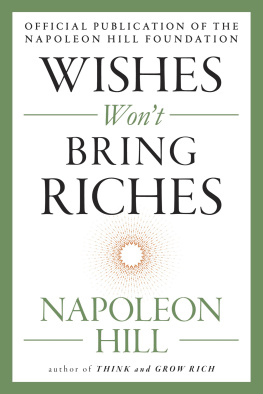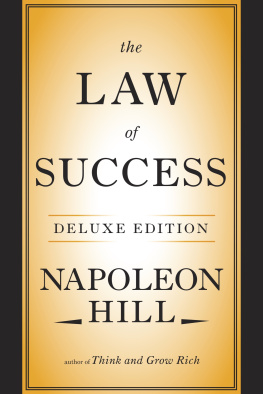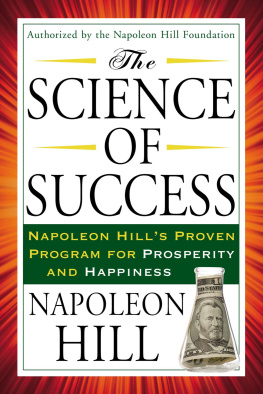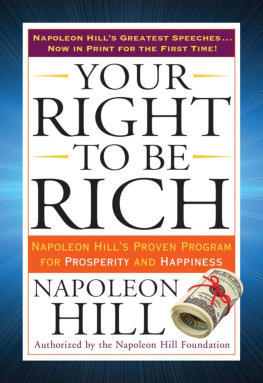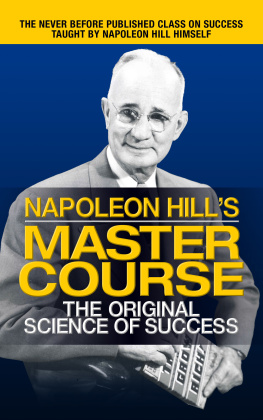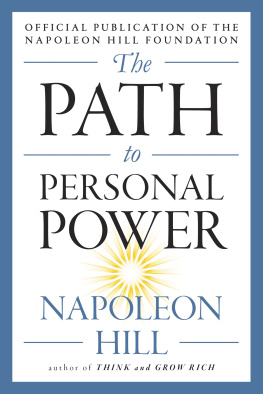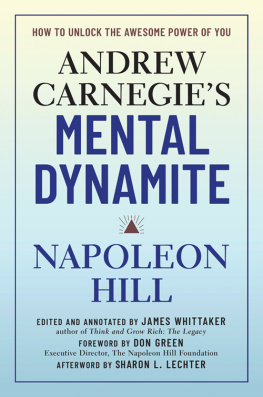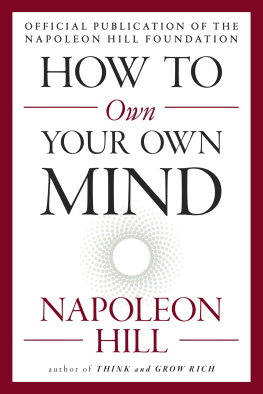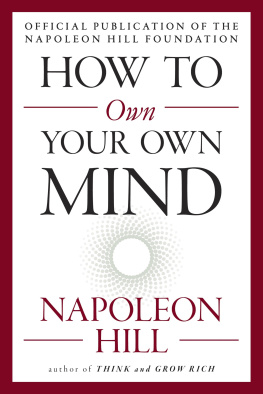YOUR OTHER SELF COMES TO YOUR AID ONLY THROUGH THE POWER OF YOUR FAITH.
FOREWORD

By Don M. Green,
Executive Director, the Napoleon Hill Foundation
Napoleon Hill wrote seventeen booklets in 1941, each one explaining one of the principles of success he had first learned from Andrew Carnegie when he interviewed him in 1908. Napoleon was a young magazine reporter at the time, assigned to interview Mr. Carnegie, and Mr. Carnegie was so impressed with him that he commissioned him to research and write a philosophy of personal achievement. Napoleon spent the next twenty years meeting with successful men and he wrote what he learned in the classic 1928 book Law of Success. In 1937 he wrote a condensed version, which he titled Think and Grow Rich.
The 1941 booklets were titled Mental Dynamite, which was a phrase used by Andrew Carnegie to describe the seventeen principles of success. Each booklet contained lengthy excerpts from Napoleons interview with Mr. Carnegie, and an analysis of the featured principle by Napoleon. Within months of their publication, the United States entered World War Two, and the booklets were set aside by an understandably preoccupied nation. The Napoleon Hill Foundation has now retrieved them from its archives and is publishing them for a new generation of readers.
In this book, the foundation has assembled three of Dr. Hills booklets explaining how actions can be used to achieve objectives once a Definite Major Purpose has been selected and a plan conceived to achieve it. These chapters therefore begin once the thought process has been successfully concluded. As Napoleon states in chapter 3, Plan your work, and work your plan. This book starts after the plan has been made, and concentrates on how to work it.
In chapter 1, Applied Faith, Napoleon begins by setting forth that portion of his 1908 interview with Andrew Carnegie focusing on this principle. Mr. Carnegie tells young Napoleon that he needs Applied Faith in order to carry out his twenty-year assignment of preparing a philosophy of success. He explains the differences between blind faith, passive faith, and active faith. Mr. Carnegie identifies the capabilities of the mind in an almost poetic fashion, then explains to Napoleon that these capabilities cannot be obtained until fears and self-imposed limitations are replaced by Applied Faith. Action, persistence, and repetition are required to develop such faith, and once it is developed it permits Infinite Intelligence to take control and achieve the objects of ones plans.
After recounting his interview with Mr. Carnegie, Dr. Hill provides two personal stories illustrating how he has used Applied Faith to achieve success. The first recounts that he lost all his money when the banks failed during the Great Depression, but he came to understand that the workings of nature and Infinite Intelligence were more important than money, and this discovery produced in him the Applied Faith he needed to persevere. The second recounts the amazing story of his son Blair, born without ears, who, thanks to the Applied Faith of Napoleon, gained the ability to hear in the absence of any of the physical instruments of hearing.
Dr. Hill then discusses the importance of the ego in attaining success, and points out how it must be controlled. As Mr. Carnegie had said, fear and doubt must be replaced with faith for the ego to attain its desires. Dr. Hill provides examples of men who controlled their own egos, and of men whose egos were controlled by their wives, but in all cases this control was essential to their success. Dr. Hill sums up the importance of Applied Faith by stating that it is the most powerful law of nature because it permits one to acquire the physical counterpart of ones desires.
Chapter 2, Enthusiasm, also begins with excerpts from Napoleons interview with Andrew Carnegie in 1908. Mr. Carnegie states that enthusiasm is necessary to clear the mind of negative elements so that faith may take their place. It is an expression of hope, which is needed to develop faith, and hope, faith, and enthusiasm are all essential to attaining success. Mr. Carnegie details the many impediments to developing and maintaining enthusiasm, such as poor health and use of alcohol or narcotics. He explains how young Napoleons upbringing in poverty carried with it the seed of an equivalent benefit, namely, the enthusiasm that Napoleons stepmother instilled in him, which motivated him to become a magazine reporter.
Mr. Carnegie speaks about how enthusiasm, as well as lack thereof, is contagious and can spread throughout a business, institution, or family. It is equivalent to a positive mental attitude, but it must be controlled by self-discipline or it can be misdirected. Every Master Mind alliance must have members who are enthusiastic, but also at least one who is not, to balance out and control the enthusiasm.
In the final analysis, enthusiasm, just like Applied Faith, is necessary to move beyond the thinking phase and act to carry out ones major plan based on a Definite Major Purpose.
Following his presentation of his interview of Mr. Carnegie, Dr. Hill elaborates on what he learned. He states that enthusiasm is faith in action and the action factor of thought, and that it can change a negative attitude to a positive one. He explains how a balanced and harmonious mind is needed to develop enthusiasm. He lists many of the positive things that enthusiasm can accomplish, most importantly converting positive emotions to negative ones and preparing the mind for the development of faith.

